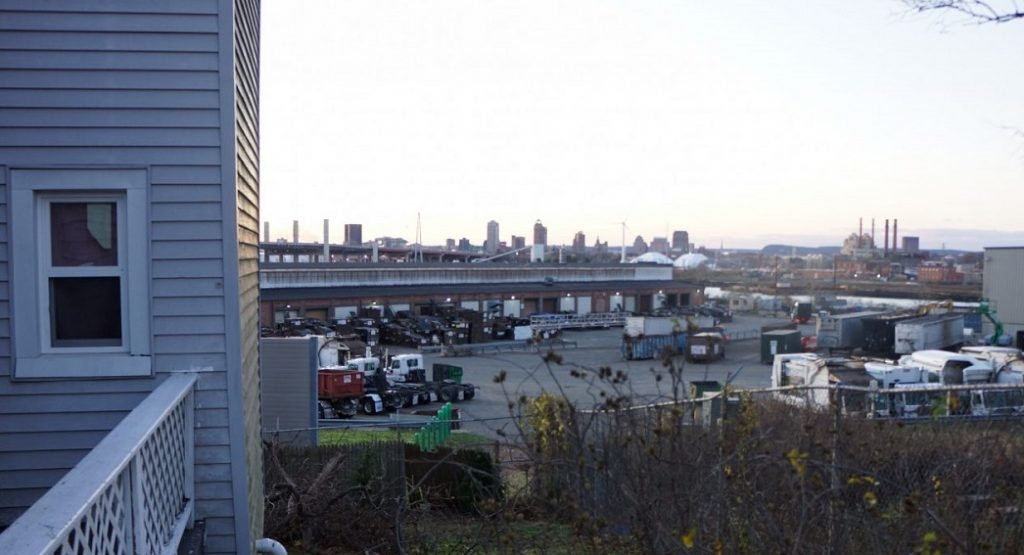
NEW HAVEN—Save the Sound has filed a petition on its own behalf to intervene in the Superior Court case of Murphy Road Recycling, LLC and Airline Avenue Realty, LLC v. New Haven City Plan Commission over environmental concerns at a Wheeler Street solid waste transfer station in the Annex neighborhood of New Haven. Save the Sound, along with other community members—including Alder Sarah Miller, Urban Resources Initiative, New Haven Environmental Advisory Council, and New Haven Urban Design League—participated in the administrative proceedings and argued that the City Plan Commission should address the history of neighborhood complaints about the facility’s operations. Save the Sound argued that strong regulation of the facility is necessary to promote environmental justice.
Murphy Road Recycling (MRR), the owner of the facility, sued New Haven’s planning commission after it renewed MRR’s special permit in May 2022 with new conditions, following public testimony from community members and concerned organizations about the facility’s impact on the Annex and its residents. Hazards at the site include noise and pollution from idling trucks, litter, odors, stormwater contamination, and vermin, all of which threaten the health of neighbors and surrounding natural resources.
MRR’s transfer station is located on 15 acres along the Quinnipiac River, where it processes municipal solid waste and construction and demolition debris. The company subleases a portion of the property to All American Waste, a trucking company that transports waste from out of town to the transfer station. The property is located near numerous “sensitive receptors,” including schools, churches, parks, day care facilities, elderly apartments, residential care facilities, and residential homes and apartments. The Annex is one of the most environmentally overburdened neighborhoods in Connecticut; residents contend with the cumulative impacts of I-91, the Port of New Haven, oil terminals, a water pollution control facility, an oil-fired power plant and, most directly, MRR’s riverfront solid waste facility. (See photos and more details in Save the Sound’s 2020 blog post about a separate, proposed expansion of the facility.)
“The owner’s attempt to override the conditions imposed by City Plan to address environmental hazards on the site violates the residents’ right to a clean, healthy neighborhood,” Roger Reynolds, senior legal counsel at Save the Sound, said. “MRR is aggravating health problems and continues to impose environmental burdens on an already overburdened area. This deteriorates the quality of life and property values of the community and poses real environmental concerns.”
When it renewed MRR’s special permit in May of 2022, New Haven’s City Plan Commission decreased the permit’s length from five years to two and imposed certain conditions in direct response to concerns raised by neighborhood residents at public hearings. The new permit:
- requires additional signage to inform truck operators of the prohibition on truck idling
- instructs MRR to adhere to the city’s noise control ordinance
- prohibits storage or temporary location of wet, putrescible waste
- requires installation of a permanent sign providing contact information for the business and safety enforcement agencies
- requires a green buffer zone of plantings between the site and abutting residences
- requires a pest control survey
In June 2022, Murphy Road Recycling sued the City Plan Commission, claiming the Commission had overstepped its authority and acted arbitrarily when it attached conditions to the special permit. The company also argued that, due to tolled expiration dates of certain special permits during the COVID-19 pandemic, it was entitled to a modified expiration date.
Save the Sound’s filing cites “traffic and idling which results in perpetual release of dangerous pollutants, like diesel fumes, nitrogen oxides, and sulfur, which causes a deleterious effect on air quality.” In addition, it states that trucks at the facility cause traffic congestion, decrease road quality, pose ingress and egress concerns for nearby properties, and imperil pedestrians. The filing also notes the transfer station poses a nuisance to neighbors in the form of “loud noises both day and night,” odors, and vermin.
Save the Sound and other community members have highlighted the transfer station’s location on the banks of the Quinnipiac River as an inappropriate use of riverfront property. The riverfront facility cuts off coastal land from water dependent uses and impedes public access to the water. Its location further degrades coastal resources and water quality in the Quinnipiac River and Long Island Sound through contaminated stormwater runoff.
